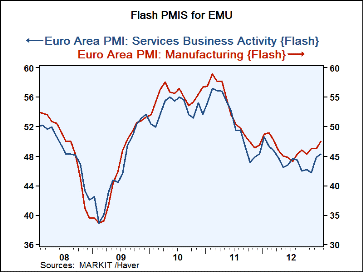 Global| Jan 24 2013
Global| Jan 24 2013Flash PMIs Improve in Europe
Summary
The EMU MFG and Services PMIs are continuing to move higher. BOTH sets of indices point to ongoing declines in output for MFG and for services, respectively. But the pace of the contraction is slowing. It's the highest MFG and [...]
 The EMU MFG and Services PMIs are continuing to move higher. BOTH sets of indices point to ongoing declines in output for MFG and for services, respectively. But the pace of the contraction is slowing.
The EMU MFG and Services PMIs are continuing to move higher. BOTH sets of indices point to ongoing declines in output for MFG and for services, respectively. But the pace of the contraction is slowing.
It's the highest MFG and services PMI readings for EMU in nine months.
Manufacturing made the turn first, services lagged then moved up strongly and has kept that move in play.
The 'flash' readings show us that in German MFG is still lagging and in France the MFG PMI is still getting weaker. In Germany, however , there is a positive combined private sector signal since its services sector is moving up sharply to a 19-month high at a very respectable level of 55.3. The German PMI for MFG rose but at 48 it is still signaling contraction.
The French MFG PMI fell to 42.9 from 44.6 in December and has hit a four-month low. The French domestic MFG surveys have been pointing to a continuation of weakness there.
The euro-Zone has been sending off some signals of improved life in the periphery with somewhat erratic signals from German recently. German signals have not been strong, but, importantly they have not been accelerating in the downward direction. The PMI for MFG in Germany is about as upbeat as MFG signals get for now. The German Service sector reading is extraordinary. A reading of 55 for German services is about a top 25% of its queue reading and that is almost 'on the moon' compared to the rest of Europe ( the current services standing for all of EMU is in the lower 15% of its historic queue).
Still the Bundesbank is looking for weaker growth in the year ahead. The IMF outlook just released was mildly negative as well. Diffusion readings from these PMIs can be tough to read. The importance of this signal for now is that it seems to be saying that Germany is starting to contain its downturn and that is an important step.
For that to stay in in place it is important that stability continue in EMU. It is far from clear that such a thing can be done. For now, early in the year, things are looking good for EMU. But it's not because anything has really been fixed; we are sort of in the eye of the storm. German elections are distracting attention for Zone-wide differences. For now Germany has been engaging the UK arguing for it to stay in EMU...
Germany's evolution will be key for the rest of Europe, as its largest economy. But so far Germany has not acted as much of a locomotive for Europe since it tends to need export-led growth. The situation in the EMU periphery is better and the worst fears have been set aside for now helping peripheral markets to recover. But as we see, today, Spain's rate of unemployment is still rising. There are still elections in Italy and troubles yet to be dealt with all around EMU.
| FLASH Readings | ||
|---|---|---|
| Markit PMIs for the E-Zone | ||
| MFG | Services | |
| Jan-13 | 47.47 | 48.28 |
| Dec-12 | 46.10 | 47.82 |
| Nov-12 | 46.16 | 46.74 |
| Oct-12 | 45.45 | 46.04 |
| Segment Averages | ||
| 3-Mo | 45.90 | 47.29 |
| 6-Mo | 45.49 | 46.93 |
| 12-Mo | 46.21 | 47.37 |
| 173-Mo Range | ||
| High | 60.47 | 62.36 |
| Low | 33.55 | 39.24 |
| % Range | 51.7% | 39.1% |
| Range: | 26.92 | 23.12 |
| AVERAGE | 51.12 | 53.23 |
| Queue % | 18.9% | 51.4% |
Robert Brusca
AuthorMore in Author Profile »Robert A. Brusca is Chief Economist of Fact and Opinion Economics, a consulting firm he founded in Manhattan. He has been an economist on Wall Street for over 25 years. He has visited central banking and large institutional clients in over 30 countries in his career as an economist. Mr. Brusca was a Divisional Research Chief at the Federal Reserve Bank of NY (Chief of the International Financial markets Division), a Fed Watcher at Irving Trust and Chief Economist at Nikko Securities International. He is widely quoted and appears in various media. Mr. Brusca holds an MA and Ph.D. in economics from Michigan State University and a BA in Economics from the University of Michigan. His research pursues his strong interests in non aligned policy economics as well as international economics. FAO Economics’ research targets investors to assist them in making better investment decisions in stocks, bonds and in a variety of international assets. The company does not manage money and has no conflicts in giving economic advice.
More Economy in Brief
 Global| Feb 05 2026
Global| Feb 05 2026Charts of the Week: Balanced Policy, Resilient Data and AI Narratives
by:Andrew Cates






